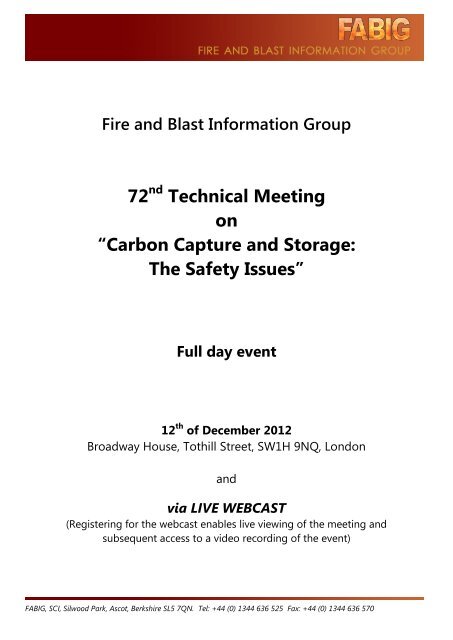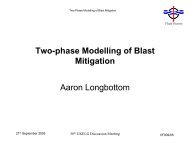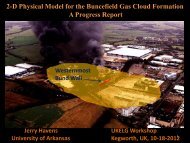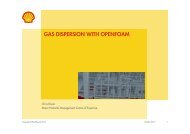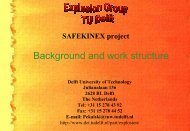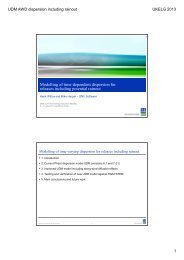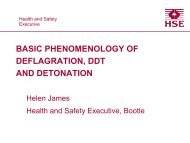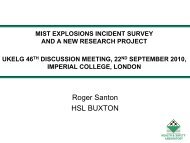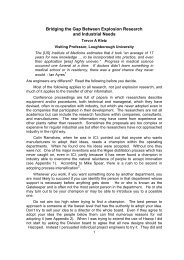Carbon Capture and Storage: The - ukelg
Carbon Capture and Storage: The - ukelg
Carbon Capture and Storage: The - ukelg
Create successful ePaper yourself
Turn your PDF publications into a flip-book with our unique Google optimized e-Paper software.
Fire <strong>and</strong> Blast Information Group<br />
72 nd Technical Meeting<br />
on<br />
“<strong>Carbon</strong> <strong>Capture</strong> <strong>and</strong> <strong>Storage</strong>:<br />
<strong>The</strong> Safety Issues”<br />
Full day event<br />
12 th of December 2012<br />
Broadway House, Tothill Street, SW1H 9NQ, London<br />
<strong>and</strong><br />
via LIVE WEBCAST<br />
(Registering for the webcast enables live viewing of the meeting <strong>and</strong><br />
subsequent access to a video recording of the event)<br />
FABIG, SCI, Silwood Park, Ascot, Berkshire SL5 7QN. Tel: +44 (0) 1344 636 525 Fax: +44 (0) 1344 636 570
Programme:<br />
SESSION TITLE<br />
TIME (UK)<br />
Registration <strong>and</strong> coffee 09:00 – 10:00<br />
<strong>Carbon</strong> <strong>Capture</strong> & <strong>Storage</strong> Health <strong>and</strong> Safety: Challenges <strong>and</strong><br />
Opportunities<br />
Rosemary Whitbread - Health & Safety Laboratory<br />
CO2RISKMAN JIP: New Industry Guidance on Major Accident Hazard<br />
Management of the CCS CO2 Stream<br />
Hamish Holt - DNV KEMA<br />
10:00 – 10:35<br />
10:35 – 11:00<br />
COOLTRANS: Introduction <strong>and</strong> Overview<br />
Julian Barnett - National Grid<br />
11:00 – 11:25<br />
Coffee break 11:25 – 11:50<br />
COOLTRANS: Fracture Control <strong>and</strong> the Design of Dense Phase CO2<br />
Pipelines<br />
11:50 – 12:25<br />
Andrew Cosham - Atkins<br />
COOLTRANS: Routeing Dense Phase CO2 Pipelines<br />
Phil Cleaver - GL Noble Denton<br />
12:25 – 12:55<br />
CO2PIPETRANS JIP: Introduction <strong>and</strong> Overview<br />
Hamish Holt - DNV KEMA<br />
12:55 – 13:05<br />
Lunch 13:05 – 14:05<br />
CO2PIPETRANS Work Package 1: CO2 Model Validation Data Collection<br />
<strong>and</strong> Public Sharing<br />
14:05 – 14:30<br />
Hamish Holt - DNV KEMA<br />
Using the CO2PIPETRANS Data: Phast Validation for CO2 Releases<br />
Henk Witlox - DNV Software<br />
CO2PIPETRANS Work Package 2: CO2 Pipeline Fracture Arrest<br />
Experiments<br />
Sigbjørn Røneid - DNV Maritime <strong>and</strong> Oil & Gas<br />
14:30 – 15:00<br />
15:00 – 15:25<br />
Coffee break 15:25 – 15:50<br />
CO2PIPETRANS Work Package 3: CO2 Corrosion Experiments<br />
Sigbjørn Røneid - DNV Maritime <strong>and</strong> Oil & Gas<br />
15:50 – 16:05<br />
CO 2 PipeHaz: Materials <strong>and</strong> Safety Considerations for CO2 Pipeline<br />
Transportation<br />
Haroun Mahgerefteh - University College London<br />
16:05 – 17:00<br />
FABIG, SCI, Silwood Park, Ascot, Berkshire SL5 7QN. Tel: +44 (0) 1344 636 525 Fax: +44 (0) 1344 636 570
Abstracts of Presentations:<br />
<strong>Carbon</strong> <strong>Capture</strong> & <strong>Storage</strong> Health <strong>and</strong> Safety: Challenges <strong>and</strong> Opportunities<br />
Rosemary Whitbread - Health & Safety Laboratory<br />
Sound health <strong>and</strong> safety credentials will be vital to the CCS sector in securing public, investor <strong>and</strong><br />
wider industrial/commercial confidence crucial to the successful introduction <strong>and</strong> expansion of this<br />
essentially unfamiliar technology. <strong>The</strong> process of identifying, managing <strong>and</strong> controlling hazards should<br />
not be regarded as a barrier hampering deployment but rather a process specifically designed to<br />
prevent <strong>and</strong> eliminate problems that might otherwise retard the transition to a radically new UK<br />
energy system. <strong>The</strong> challenge comes in managing the uncertainty that surrounds underst<strong>and</strong>ing the<br />
hazards <strong>and</strong> demonstrating good risk management in the absence of established st<strong>and</strong>ards <strong>and</strong><br />
guidance for CCS.<br />
CO2RISKMAN JIP: New Industry Guidance on Major Accident Hazard Management of the CCS CO2<br />
Stream<br />
Hamish Holt - DNV KEMA<br />
<strong>The</strong> presentation will introduce a new industry guidance developed through the CO2RISKMAN JIP to<br />
help CCS projects underst<strong>and</strong> <strong>and</strong> manage their major accident hazard risks associated with h<strong>and</strong>ling<br />
very large quantities of impure CO2. <strong>The</strong> guidance covers the main links of the CCS chain (i.e. CO2<br />
capture plant, on <strong>and</strong> offshore pipelines, buffer storage, ship carriers, offshore injection platforms <strong>and</strong><br />
injection wells) <strong>and</strong> provides foundation information for someone entering the CCS industry through<br />
to specific guidance on CO2 stream hazard identification, hazard assessment <strong>and</strong> hazard risk<br />
treatment.<br />
COOLTRANS: Introduction <strong>and</strong> Overview<br />
Julian Barnett - National Grid<br />
This talk will set the scene <strong>and</strong> give an overview of the COOLTRANS Research Programme.<br />
COOLTRANS: Fracture Control <strong>and</strong> the Design of Dense Phase CO2 Pipelines<br />
Andrew Cosham - Atkins<br />
This talk will explain the work undertaken to consider the specification of the pipe toughness required<br />
to prevent the possibility of long running fractures arising. It will cover the methods that are used to<br />
define toughness requirements in dense phase CO2 pipelines <strong>and</strong> highlight the need for experimental<br />
validation.<br />
COOLTRANS: Routeing Dense Phase CO2 Pipelines<br />
Phil Cleaver - GL Noble Denton<br />
This talk will consider the application of risk assessment in establishing the requirements for routeing<br />
dense phase pipelines. It will cover the reasons why a new approach has been developed <strong>and</strong> will<br />
explain how this approach could be used in practice.<br />
CO2PIPETRANS JIP: Introduction <strong>and</strong> Overview<br />
Hamish Holt - DNV KEMA<br />
This presentation will give an overview of the CO2PIPETRANS Joint Industry Project (JIP). Phase 1 of<br />
the JIP resulted in the development <strong>and</strong> release of DNV-RP-J202, a recommended practice for the<br />
design <strong>and</strong> operation of CO2 pipelines. Phase 2 is on-going with the aim of filling identified<br />
knowledge gaps through experimental research funded by the JIP partners. DNV-RP-J202 will then be<br />
updated to reflect the improved knowledge.<br />
FABIG, SCI, Silwood Park, Ascot, Berkshire SL5 7QN. Tel: +44 (0) 1344 636 525 Fax: +44 (0) 1344 636 570
CO2PIPETRANS Work Package 1: CO2 Model Validation Data Collection <strong>and</strong> Public Sharing<br />
Hamish Holt - DNV KEMA<br />
WP1 of the CO2PIPETRANS JIP has the goal of collecting <strong>and</strong> making available in the public domain<br />
suitable data that can be used for CO2 release model development <strong>and</strong> validation. <strong>The</strong> presentation<br />
will provide an overview of the work that has been undertaken at the Spadeadam test site to collect<br />
<strong>and</strong> share release <strong>and</strong> dispersion data from liquid <strong>and</strong> supercritical CO2 releases up to 150 bar <strong>and</strong><br />
150°C through orifices up to a diameter of 25 mm. <strong>The</strong> presentation will also present details of pipe<br />
depressurisation tests that are due to be completed in November <strong>and</strong> much larger dispersion releases<br />
that are being planned for early next year.<br />
Using the CO2PIPETRANS Data: Phast Validation for CO2 Releases<br />
Henk Witlox - DNV Software<br />
This presentation will present <strong>and</strong> discuss the validation of discharge <strong>and</strong> subsequent atmospheric<br />
dispersion for pressurised CO2 releases using the consequence modelling package Phast based on<br />
experimental data shared by the CO2PIPETRANS JIP.<br />
CO2PIPETRANS Work Package 2: CO2 Pipeline Fracture Arrest Experiments<br />
Sigbjørn Røneid - DNV Maritime <strong>and</strong> Oil & Gas<br />
DNV, through WP2 of the CO2PIPETRANS JIP is managing test site work that is undertaking<br />
propagating crack experiments to collect crack propagation data for CO2 pipelines. This presentation<br />
will provide an overview of the propagating crack experiments undertaken in Norway <strong>and</strong> will also<br />
give details of the further large scale work planned for next year.<br />
CO2PIPETRANS Work Package 3: CO2 Corrosion Experiments<br />
Sigbjørn Røneid - DNV Maritime <strong>and</strong> Oil & Gas<br />
<strong>The</strong> objective of WP3 of the CO2PIPETRANS JIP is to determine the corrosion mechanism <strong>and</strong> the<br />
corrosion rate of carbon steel in liquid <strong>and</strong> supercritical phase CO2 with various amounts of impurities<br />
like O2, H2, SOx, NOx, <strong>and</strong> H2S with water present at 50 <strong>and</strong> 500 ppmv. A large number of autoclave<br />
experiments have been performed with various combinations of impurities <strong>and</strong> the results will help<br />
determine a safe operating window for CCS projects. <strong>The</strong> presentation will provide an update on<br />
progress of this work.<br />
CO2PipeHaz: Materials <strong>and</strong> Safety Considerations for CO2 Pipeline Transportation<br />
Haroun Mahgerefteh - University College London<br />
Pipelines are considered as the most reliable <strong>and</strong> cost effective way of transporting large amounts of<br />
CO2 over long distances for <strong>Carbon</strong> <strong>Capture</strong> <strong>and</strong> Sequestration (CCS). Given that CO2 is an asphyxiant<br />
at high concentrations the safety of CO2 pipelines is central to the public acceptability of CCS as a<br />
viable means of combating the impact of global warming. Factors affecting the accurate hazard <strong>and</strong><br />
risk assessment of CO2 pipelines include corrosion, hydrate formation <strong>and</strong> propensity to fast running<br />
ductile <strong>and</strong> brittle factures. Special consideration is given to the impact of impurities in the CO2 stream<br />
captured using various technologies on the above hazards. Some recent progress concerning the<br />
knowledge gaps in the modelling of outflow <strong>and</strong> subsequent dispersion of CO2 following the<br />
accidental rupture of pressurised CO2 pipelines will be presented.<br />
FABIG, SCI, Silwood Park, Ascot, Berkshire SL5 7QN. Tel: +44 (0) 1344 636 525 Fax: +44 (0) 1344 636 570
Continuing Professional Development:<br />
We would like to remind you that members of most engineering institutions can count<br />
FABIG Technical Meetings as Continuing Professional Development (CPD). Attendance<br />
certificates are issued to delegates upon request.<br />
Attendance Fee:<br />
FABIG Members:<br />
Non-members:<br />
Free<br />
£350 (excluding VAT) per person for the London meeting<br />
£200 (excluding VAT) per person for the Webcast<br />
Registration:<br />
Please register for the event online at www.fabig.com/events<br />
Alternatively, please contact Lis Oliver at SCI:<br />
T: +44 (0) 1344 636 525<br />
E: fabig@steel-sci.com<br />
FABIG, SCI, Silwood Park, Ascot, Berkshire SL5 7QN. Tel: +44 (0) 1344 636 525 Fax: +44 (0) 1344 636 570


